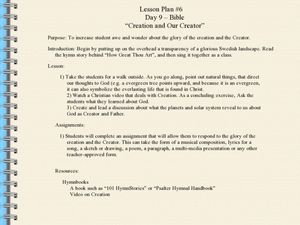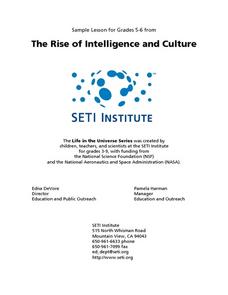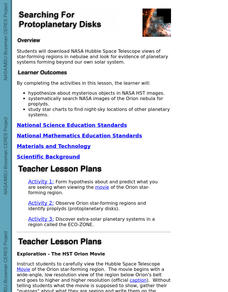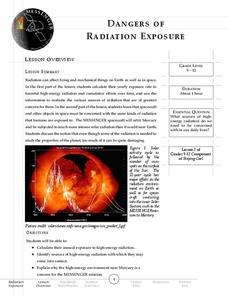Curated OER
Interstellar Real Estate - Defining The Habitable Zone
Students explore the orbital characteristics a planetary home needs to support Earth-like life forms. They develop an understanding of critical planetary mass to determine which newly discovered planets might be capable of supporting life.
Curated OER
Creation and Our Creator
Young scholars consider the creation. In this creation lesson, students observe nature and relate natural things to the creation. Young scholars watch a Christian video about the creation.
Curated OER
Metrics And Measurements
Students engage in a study of measuring distances between geographical locations on a map. They are able to define and use the map scale in conjunction with the metric system. For this lesson they make their own maps and measure the...
Curated OER
Specializing in Space
In this literature book review activity, pupils read a nonfiction book about space or space exploration before choosing a topic to explore further. They choose from 7 activities such as designing a model, writing a letter, write about...
Curated OER
Unit 2 Sun & Stars
Students describe stellar objects using terms such as stars, planets, satellites, orbits and light. In this sun and stars unit, students research stellar objects through seven individual lessons discovering star characteristics, how...
Curated OER
Science Trail
Young scholars explore the solar system by conducting Earth science experiments. In this Sun lesson, students identify the different seasons on Earth and discuss their purpose and cause. Young scholars create a sundial and observe the...
Curated OER
The Earth, Sun Mood and Stars Unit (Planets too!)
Fifth graders prepare five activities to do then show their energy saving skills. For this investigative lesson students create five projects then participate in an energy saving demonstration.
Curated OER
Got Space?
Students explore our solar system of planets through research and activities. Using cooperative grouping and interaction, students gain an understanding of how the characteristics of the planets differ from one another.
National Endowment for the Humanities
Galileo: Revealing the Universe
To gain an understanding of the significance of Galileo Galilei's revolutionary ideas, class members watch the short video "Stargazing Before Galileo," and conduct a close reading of Galileo's Sidereal Messsenger. They then...
Curated OER
Extraterrestrial Communication: Can We Talk to Anybody Out There?
Pupils examine the possibilities of communication with other living organisms within our solar system through research and hands on activities, as well as observing and analyzing teacher demonstrations.
University of Colorado
Are All Asteroids' Surfaces the Same Age?
Did you know scientists can tell the age of an asteroid by looking closely at its craters? This final lesson of a six-part series focuses on two asteroids, Gaspra and Ida, in order to demonstrate the concept of dating asteroids. Scholars...
Curated OER
Searching For Protoplanetary Disks
Students download NASA Hubble Space Telescope views of star-forming regions in nebulae and look for evidence of planetary systems forming beyond our own solar system. They hypothesize about mysterious objects in NASA HST images.
Messenger Education
Dangers of Radiation Exposure
Gamma radiation, which is harmful, is useful in treating cancers. In the second lesson in a series of four, young scientists take surveys and calculate their yearly exposure to ionizing radiation. Then they read about how harmful their...
University of Connecticut
Building Your Own Biosphere
On September 26, 1991, four women and four men entered the scientific experiment, Biosphere 2; the doors were sealed for two years in order to study the interactions of a biosphere. In the activity, scholars explore biospheres by...
PBS
Robo Arm
Future engineers create robotic arms like those on rovers built by NASA in the second lesson plan of the series. They test their devices by attempting to pick up and move cups to a specified location.
Curated OER
Interplanetary Travel Guide
In groups of six, middle school space scientists create an imaginative travel brochure for attracting visitors to the planet Mars. Information must include surface features and atmospheric conditions. Although time-consuming, this is a...
Curated OER
Our Home in the Milky Way
Students gain appreciation of the vastness of our galaxy by viewing an applet about the Milky Way. Students hypothesize about how long it would take to get from Earth to Pluto.
Journey Through the Universe
How Far is Far?
The earth only revolves around one thing — and it's not any of your pupils. The lesson includes two activities dealing with the distance to the sun and the moon. First, scholars create a pin hole camera and use the rules of similar...
Curated OER
Why is the Average Temperature Greater on Venus than on Mercury?
Students examine the reasons why the temperature is higher on Venus than on Mercury. In groups, they analzye both planet's atmospheres and determine the rate of global warming on each. They use the internet to research the planets in...
Curated OER
Sweet Candy Comets
Fourth graders use candy to make a comet. In this lesson, 4th graders examine the role comets have played throughout history, students watch NASA videos about comets and complete the lesson by making an edible model of a comet. This...
Curated OER
Lesson 4 Activity 1: Mapping the Third Dimension
Students work in pairs to construct a simple stereoscope.
Curated OER
Solving Saturn's Mysteries
Students study the Cassini spacecraft and its travel to Saturn. They discover the results of the space mission and examine images of Saturn that Cassini sent back.
Curated OER
Wow, Saturn Is Much Bigger Than Earth!
Students compare and contrast the sizes of Earth and Saturn. They create scale illustrations of each planet and label them. They share their models with the class.
Curated OER
What Do I See When I Picture Saturn?
Pupils create their own Saturn Discovery logs. They draw pictures of the planet and its founder. They share their drawings and writings with partners.

























